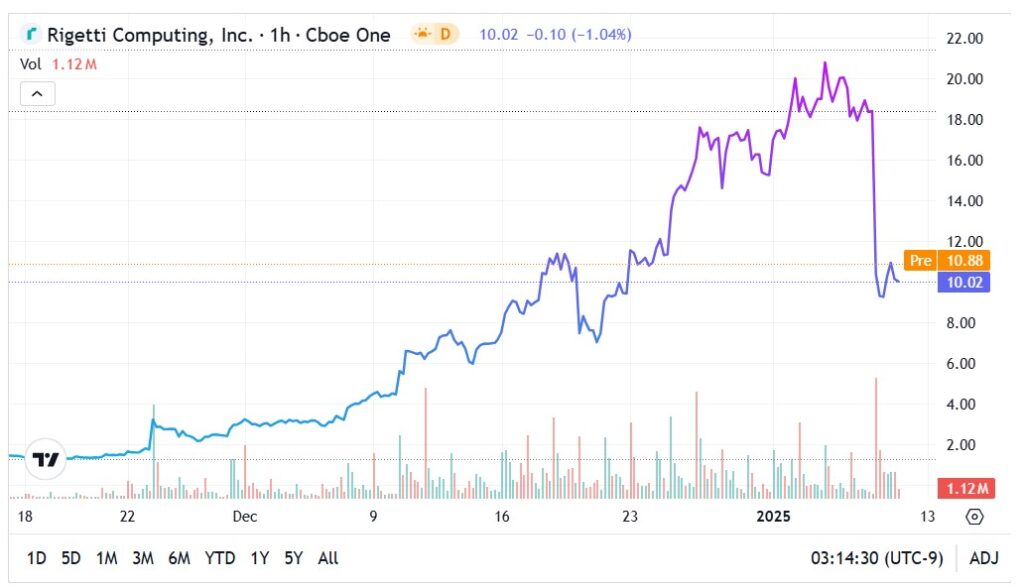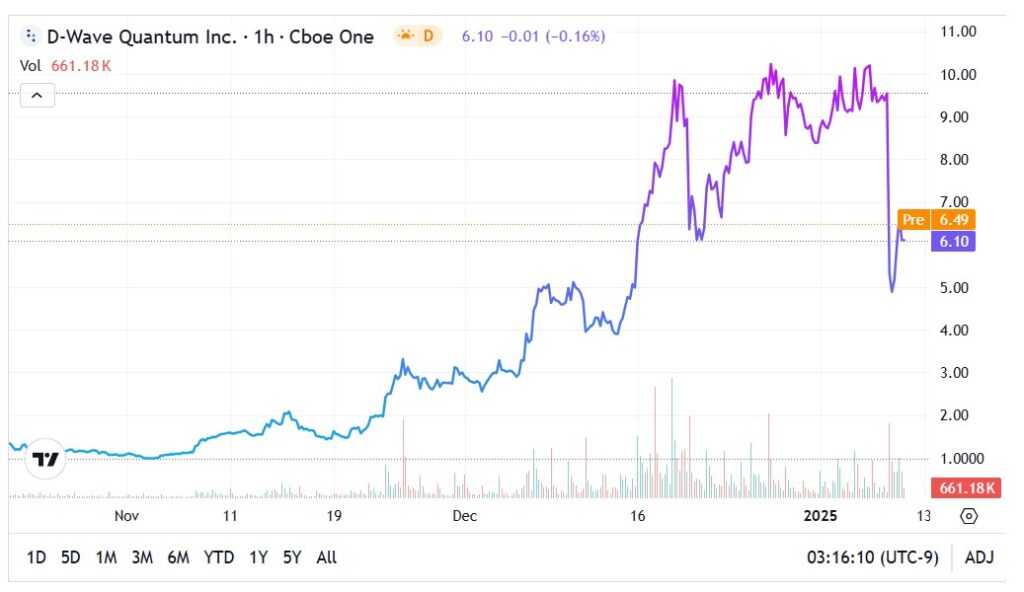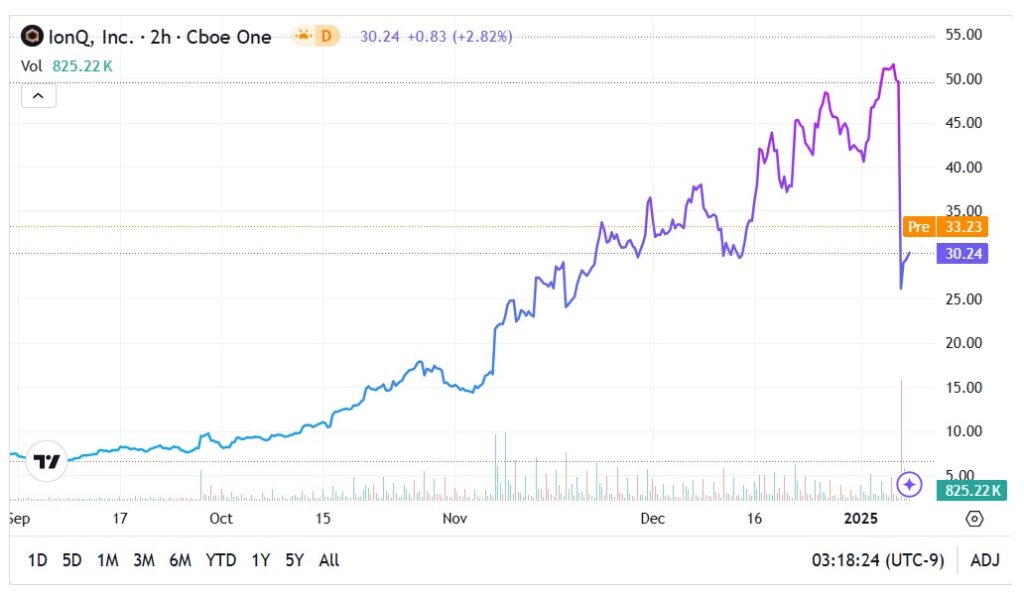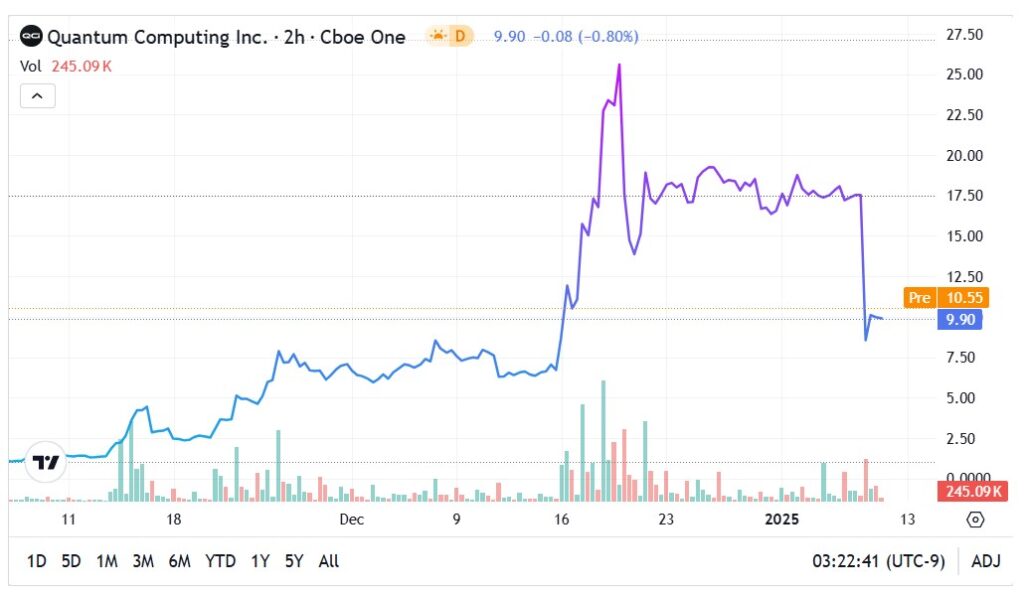Zinger Key Points
- Nvidia’s Jensen Huang sent quantum computing stocks tumbling following questions about immediate utility.
- Investors should adopt a careful approach to the sector rather than blindly buying the dip.
- Find out which stock just plummeted to the bottom of the new Benzinga Rankings. Updated daily—spot the biggest red flags before it’s too late.
While hailed as a tech genius, Nvidia Corp. NVDA CEO Jensen Huang isn't exactly making friends among key players in the quantum computing field. During the semiconductor giant's analyst day, Huang warned that quantum computers' practical applications might be 15 to 30 years away.
In response, sector-related securities fell sharply.
Naturally, executives working in the arena quickly rebutted Huang, noting that the tech ecosystem already incorporates quantum-based innovations. To be sure, the retail investment community appears to agree with the bullish perspective, with several quantum computing stocks witnessing stratospheric growth over the past several weeks.
As such, investors may be tempted to buy the dip, interpreting the recent fallout as a speed bump against a long-term narrative. Still, it's good to take an objective view of the data before making a decision.
Rigetti Computing Inc
Over the last six months, Rigetti Computing Inc's RGTI performance has been simply astonishing, gaining almost 830%. However, it received a rude awakening thanks to Huang's commentary. As of this writing, it's on pace to lose about 42% of market value relative to Monday's opening price of $18.54.

Historically, the worst weekly loss that RGTI stock suffered is 37.47%, which occurred in June 2022. What's interesting, though, is that investors generally avoid extreme dips in RGTI, defined as weekly losses of 20% or worse. Of the 11 such instances posted since April 2021, only five times (45.45%) did Rigetti rebound four weeks later.
During the six times when RGTI stock tumbled a month out, the average loss came out to 20.33%. Therefore, a statistical risk exists that for the options chain expiring Feb. 7 (four weeks from today), shares may fall to $8.56. Aggressive speculators may consider the 11.50/8.50 bear put spread in anticipation that RGTI may fall to the short put strike price of $8.50.
D-Wave Quantum
Another high-flying name among quantum computing stocks, D-Wave Quantum QBTS saw its shares rise 400% in the trailing half-year period. However, it too got cold water splashed on its face. At time of writing, D-Wave Quantum stock trades at $6.52, down nearly 29% from Monday's opening price of $9.17.

Statistically, whenever D-Wave Quantum loses between 20% to 30% of value in a week, there's a 66.67% chance that a month later, the security could be in the red. Further, the average loss comes out to 34.15%.
Notably, when D-Wave Quantum suffers a 30% weekly loss or worse, the odds of downside four weeks out rises to 75%, with an average loss of 25.2%.
Realistically, then, D-Wave stock risks declining to $4.89 by Feb. 7. One aggressive idea to consider is the 7/5 bear put spread, which anticipates that D-Wave Quantum stock will fall to the key technical support line of $5.
IonQ Inc
One of the most popular quantum computing stocks, IonQ IONQ managed to pop 260% since early July of last year. However, it also suffered terribly due to the high-level criticism of the sector. Currently, shares trade hands at $34.12, down 29.36% from Monday's opening price of $48.30.

Dubiously, IonQ is on pace to post a record. Since its January 2021 debut, IonQ stock's worst weekly performance was a loss of 24.88%, incurred in November 2021. What's even more problematic, there have only been three instances when shares dropped 20% or more in one week. In the subsequent four weeks, there have been no instances when IonQ posted a positive return.
That's not to say that the quantum computing specialist can't make a comeback from the current malaise. Indeed, the average loss four weeks out lands at only 7.62%, indicative of an extreme tug-of-war. Still, the numbers at the moment don't favor bullish speculation.
Therefore, aggressive traders may consider the 32/30 bear put spread expiring Feb. 7, anticipating that the pessimists will drive shares down to the psychologically significant $30 level.
Quantum Computing
Finally, no one can touch Quantum Computing QUBT in terms of outright performance in the sector.
In the past six months, Quantum Computing gained almost 1,639%, a beneficiary of an explosive catalyst meeting an ultra-small share price. However, it's currently trading at $11.03, thus on pace for a severe decline of 36.24% relative to Monday's opening price of $17.30.

Historically, Quantum Computing stock is no stranger to extreme volatility. Since January 2020, its worst weekly loss was 40.74%, posted in February 2023. That said, in overall terms, investors tend to appreciate bouts of red ink as buying opportunities. There have been 15 instances when Quantum Computing lost 20% or more in a one-week period. Four weeks later, shares returned a positive figure nine times or 60%.
The average positive return clocks in at 48.8%, implying an upside price target of $16.41. Statistically, then, investors who want to buy the dip may consider doing so for Quantum Computing stock.
For the options chain expiring Feb. 7, aggressive traders may target the 12/16 bull call spread.
Now Read:
Image: Shutterstock
Edge Rankings
Price Trend
© 2025 Benzinga.com. Benzinga does not provide investment advice. All rights reserved.
Trade confidently with insights and alerts from analyst ratings, free reports and breaking news that affects the stocks you care about.